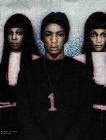
| 19
Tricky |
Anger and mourning,
the hard way |
||
| "Listen to this, exclaims
the artist presently known as tricky, setting down his spliff and bounding
excitely across the living room of his Tribeca apartment to the stereo.
"The lyrics are torally stupid! It's fuckin wicked! The 29 year old pops
a cassette into the tape deck and begins bobbing his shoulders manically
as the music kicks in...Over the strains of Pleistocene guitar riffing
and a funky, John Bonham - like beat, Neneh Cherry's spunky voice comes
bubbling forth. The auhor of the song begins reciting the words along with
the recording: "I wanna know
if you'll try for me/ I wana know if you'll die for me/ I wanna know if you'll take a chance/ I wanna know if you'd like to dance." When the guitar comes barreling back in, Tricky cracks a smile so big his eyes scrunch up into narrow slits. "It'd be huge!" he gushes, picking up his joint again. "It's poptastic!" Alas, the tune from the Cherry album, which was written and produced by Tricky...won't get a chance to be huge, at least anytime soon. In fact, it probably won' ever come out, thanks to Cherry's handlers, who shelvd the album for not being "poppy" enough. "They got scared" he recalls with a laugh. "They hought it sounded too much like me." The "Tricky Sound" that so frightened the Cherry Camp has by now become a staple of the fin de siecle pop mainstream: warm, languorous beats mixed with cold-hearted vocal recriminations, a groggy vibe brimming with both romance and menace. The hip-hop nations's eccentric foreign-exchange student, Tricky makes music as complicated as he is: a mixed-race, self-described "mongrel" who eschews radio-friendly banalities in favor of obsessing on the struggles between light and darkness, good and evil, black and white, male and female. Sultry vocals from chanteuse Matrina Topley-Bird (the mother of his two-and-a-half-year-old daughter Mazy) soar above the mix, while tricky breathily mutters downbeat poetry - they're a Sonny and Cher for the End Times. Despite its hypnotic powers, however, Tricky's bad-mood music has yet to prove conducive to huge Stateside sales; evidently, he's too groove-oriented for the stadium floor, too lethargic for the dance floor, and too intense for the chill-out room. "I've always liked noises more than melody," he explains, putting down his joint to take a hit from his asthma inhaler. "My thing is, it ain't all about the Benjamins, it's all about my art." Such uncompromising spirit was on full display last winter when Tricky learned of remarks made my Eric Kronefeld, the president and COO of Polygram, Island's parent label. During a deposition for a lawsuit, Kronefeld stated that "If every African-American male in the United States was disqualified from pursuing a livelihood...because of a prior criminal record, then there would be no, or virtually no, African-American employees in our society or in our industry." Outraged, Tricky recorded his response in the form of a song. "Divine Comedy," which was quickly pressed and and sent out to selected members of the media. "Every black man has a criminal conviction / How can you say that with conviction?" he hisses admist the murk before declaring "I wanna leave with Blackwell," a reference to Island Records founder Chris Blackwell, a close friend who acrimoniously departed the company in December. "I'd love to leave, but it's never gonna happen," says Tricky of the rift with his label. "Not unless they drop me, which I got over being scared of a long time ago." (Kronfeld himself left the company in March.) Given such a salvo, it's no surprise that Tricky's upcoming album, Angels with Dirty Faces, is his angriest work yet. The leadoff single, the mournful "Broken Homes," (with PJ Harvey guesting on vocals), is a tribute to the Notorius B.I.G. Tricky wrote it the night he learned of Biggie's death - a mere two days, it happens, after Tricky had been asked to come up with a Biggie remix. The late Mr. Smalls also casts his prodigous shadow over "6 Minutes," in which Tricky asserts that "All the tough guys are dropping like flies," as well as over the virulent "Record Companies," in which Tricky declares "Record companies love when they kill themselves / It boosts up record sales / Now which one of you's gonna be the next niggy / you don't have to worry about them / 2Pac holding hands with Biggie." "It's fucking depressing," says Tricky of hip-hop's outbreak of bloodshed. "I don't see how bulletproof vests and music coincide." Besides winnowing down the track of selection for the new album, Tricky has further crowded his already hectic schedule with the chores of running his own label, Durban Poison, which inked a deal with DreamWorks last fall. In between signing a dozen acts, he's been putting the finishing touches on Product of the Environment, a sort of spoken-word album featuring some of Tricky's roughneck uncles spinning violent tales of the hard-knock life, and Drunkenstein, which Tricky describes as the historic first-ever collaboration between American and British rappers, to say nothing of his jam-packed dance card of collaborations, production jobs, and remix projects. It's been a dizzying ride from total obscurity to Nearly God, but Tricky perseveres by keeping his goals simple. "I just want to write good songs, like Bob Marley, or Kurt Cobain," he says, readying another spliff. "That's my ambition and i'm still not there yet." 1997 Ranking: 20 Mike Rubin |
|||
| 'Angels...' presskit | |
| analyze me (Tricky) | |
| Tricky biography | |
| Martina discography |